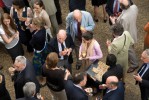ChemCareers 2013, Hyderabad
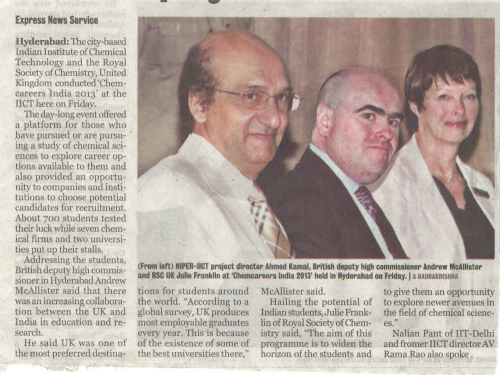
Around 750 students attended ChemCareers India, held in association with RSC-DS, RSC-UK, the British Council and the Indian Institute of Chemical Technology (IICT).
The day was split into three sessions. The speakers included Prof Peesapati (Hon. Secretary of the RSC Deccan Section), Mr Andrew MacAllister (British Deputy High Commissioner), Julie Franklin (Royal Society of Chemistry careers advisor) and Dr Ahmed Kamal (IICT). Opportunities for chemistry and pharmacy graduates were discussed. Parallel sessions by experts from industry and academia were held.
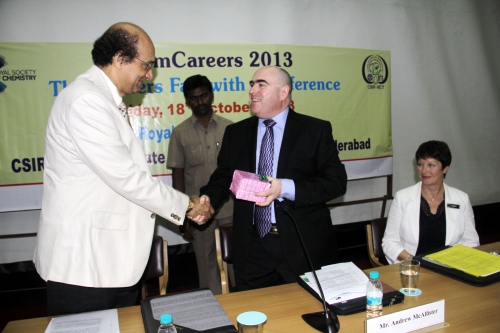
Later, there were stalls from R&D, industry and academia. In the final session, skills such as resume writing, drafting statements of purpose and offering references, and searching for jobs through social media were all covered by Mr Arun Pillai (Hyderabad Deputy High Commission), Ms Julie Franklin and Mr Niroop Raccha (Texavi solutions).
“It was a successful & satisfying program conducted by RSC and appreciated by one and all.”
World Diabetic Day lecture
On 14
th November 2013 being Worlds Diabetic day RSC-DS organized an expert lecture on “Management of Diabetes” at National Institute of Pharmaceutical Education and Research (NIPER) for teaching staff, research students and MS pharma students.
A brief summary of Dr Das talk is given below.
Abdominal obesity, insulin resistance, hyperlipidemias, hypertension, type 2 diabetes mellitus, and atherosclerosis form important components of the type 2 diabetes mellitus and metabolic syndrome.
Hyperglycemia is proinflammatory whereas insulin has anti-inflammatory actions. Ventromedial hypothalamic lesion, neuron-specific insulin receptor knockout, and disruption of endothelial nitric oxides synthase (eNOS) produce all the features of the type 2 diabetes mellitus and metabolic syndrome. The brain is rich in insulin receptors, and administration of insulin into the hypothalamus reduces food intake and lowers plasma glucose. This implies that BDNF may be of therapeutic importance in the prevention and treatment of type 2 diabetes mellitus and metabolic syndrome.
Top of the Bench
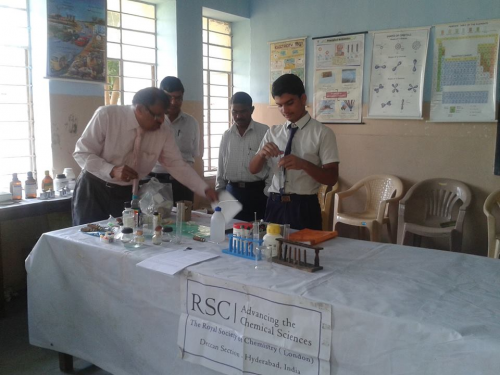
RSC-Deccan Section in association with the Alumni association of Model school, Osmania University arranged a
“Top of the bench” program on hands on experiments in chemistry for 8th,9th and 10th class students on 30
th November, 2013 at Model High school, Hyderabad. The program is aimed at giving school children the direct benefit of dealing with school level “
chemistry lab experience” in an interesting way. About 90 school students and 20 school teachers actively participated in the event. In this connection a practical laboratory for school students was inaugurated in a modest way in the school premises with the help of RSC-Deccan Section.
Prof. V Peesapati and Dr Y V D Nageshwar organized the event to demonstrate chemistry lab experiments like pH determination using cabbage juice with acids and alkalis around the house (vinegar, lemon juice, water, NaCl, baking soda, sodium carbonate, domax and sodium hydroxide etc.), solubility of ionic and covalent compounds and density determination apart from separation techniques using thin layer chromatography with the aid of minimally expensive materials.
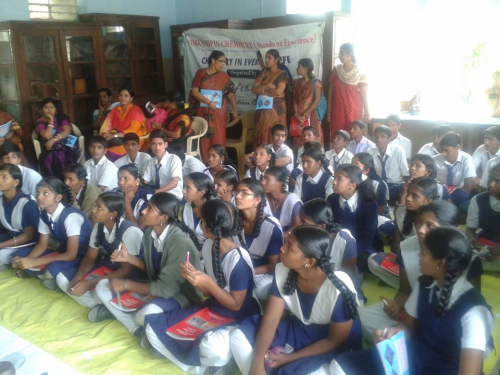
The participants, who are from low- income group parents, expressed their pleasure in conducting lab experiments on their own with the help of RSC-DS and many of them expressed their opinion that RSC should help school students guiding them in their science pursuit in future also.
RSC-DS has distributed certificates, books, pens and periodic tables with the RSC logo to all participants.
The Principal of the school expressed his happiness for the event and proposed a vote of thanks.
RSC-DS would like to thank the Royal Society of Chemistry, UK, for their support in organizing these events.
Seminar on advanced topics in Chemistry and Quiz program 7th December, 2013
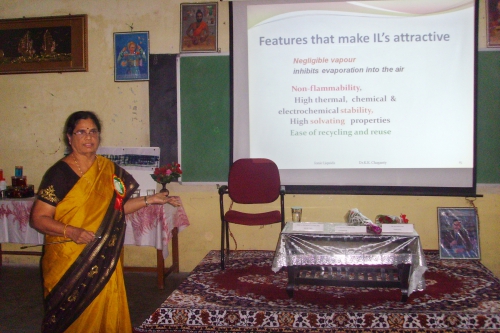
In continuation of our activities, RSC-DS has conducted a one day seminar in association with
Holy Cross College for women, Hyderabad. The seminar has provided an opportunity not only for UG and PG students but also for college teachers, to expose them to topics of interest in the field of chemistry by inviting Expert lectures.
Prof. V Peesapati, Hon. Secretary, Deccan Section welcomed the participants and speakers and explained briefly the aim of the seminar and RSC activities in this direction.
In the morning session Dr. R Srinivas, Senior Scientist, IICT, spoke on “Basics in Mass Spectra”. He gave a detailed account of the history of mass spectroscopy, including the noble Nobel laureates that mass spectrometry produced over the years. He dwelled upon the fundamentals of high resolution mass spectrometry and its importance in structure elucidation of organic molecules.
Dr. Ch Krishna Kumari delivered a talk on “Ionic Liquids”. She discussed the growing importance of ionic liquids for the last 10 years because of their unique properties that make them desirable for many chemical applications; manipulating the materials for specific functions.
Dr. S Sree Lakshmi spoke on “Career Opportunities” for UG & PG students of chemistry. She also stressed the upcoming fields like patent laws, regulatory affairs and scientific writing apart from regular teaching, research and working in R&D institutions.
In the afternoon session, a Quiz program was conducted. The event was designed to encourage and give them an opportunity for graduate students to prepare job interviews for their future career. Inter college competition saw six teams (two from each college) from various colleges competing with one another to take the honours.
The quiz generated a great excitement amongst students of different colleges. Dr. V Jayathirtha Rao acted as a quiz master.
The event was attended by over 200 students (mainly ladies) and faculty members from various colleges in the area.
RSC-DS honoured the guest speakers and gave prizes to winners and distributed to the quiz participants.
Dr. SAr. Sarguna , Prinicipal, Holy cross college proposed a vote of thanks.
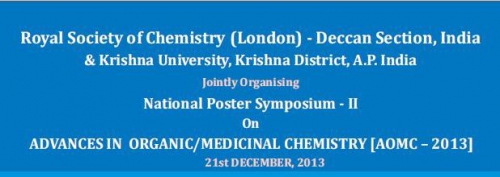 National Poster Symposium
National Poster Symposium
A poster symposium for senior PhD students was held on 21st December 2013 at Krishna University, AP, India.
